- Home
- Naguib Mahfouz
Arabian Nights and Days Page 3
Arabian Nights and Days Read online
Page 3
IX
When he lay down to sleep that night the other presence took control and the voice said mockingly, “You eat, drink, and sleep, and it is for me to exercise patience!”
“It’s an onerous assignment. Those with such power as yourself do not realize how onerous,” he said miserably.
“But it’s easier than killing the little girl.”
“What a waste! I had long been thought of as among the best of the good.”
“External appearances do not deceive me.”
“They were not simply external appearances.”
“You have forgotten things that would bring sweat to one’s brow with shame.”
“Perfection is God’s alone,” he said in confusion.
“I also don’t deny your good points, and it was for this that I nominated you to be saved.”
“If you hadn’t forced your way into my life, I wouldn’t have got myself involved in this crime.”
“Don’t lie,” he said sharply. “You alone are responsible for your crime.”
“I don’t understand you.”
“I really judged you too favorably.”
“If only you’d just left me alone!”
“I’m a believing genie and I told myself, ‘This man’s goodness exceeds his wickedness. Certainly he has suspicious relations with the chief of police and doesn’t hesitate to exploit times of inflation, but he is the most honest of merchants, also he is charitable and undertakes his religious devotions and is merciful to the poor.’ Thus I chose you to be saved, to be the saving of the quarter from the head of corruption, and the saving of your sinful self. Yet instead of attaining the visible target, your whole structure collapsed and you committed this repugnant crime.”
Sanaan moaned and kept silent, while the voice continued, “The chance is still there.”
“And the crime?” he asked helplessly.
“Life gives opportunities for both reflection and repentance.”
“But the man is an impregnable fortress,” he said in a voice clinging to a vestige of hope.
“He will invite you to meet him.”
“That seems unlikely.”
“He will invite you—be sure and be prepared.”
Sanaan thought for a while, then inquired, “Will you promise me deliverance?”
“I chose you only for deliverance.”
So exhausted was Sanaan that he fell into a deep sleep.
X
He was getting ready to go to the café when Umm Saad said, “There’s a messenger from the governor waiting for you in the reception room.”
He found the private secretary, Buteisha Murgan, waiting for him with his sparkling eyes and short beard.
“The governor wants to see you.”
His heart beat fast. He realized that he was going off to commit the gravest crime in the history of the quarter. Perhaps it worried him that Buteisha Murgan should be acquainted with the circumstances surrounding his visit, but he took reassurance in Qumqam’s promise.
“Wait for me,” he said, “till I put on my clothes.”
“I shall go ahead of you so as not to attract attention.”
So the man was bent on keeping the secret nature of the meeting, thus facilitating his task. He began anointing himself with musk, while Umm Saad watched, nursing a sense of unease that had not left her since the night of the dream. She was held by a feeling that she was living with another man and that the old Sanaan had vanished into darkness. Without her noticing, he slipped into his pocket a dagger with a handle of pure silver that he had received as a gift from India.
XI
Ali al-Salouli received him in his summer mansion at the governorate’s garden, appearing in a flowing white robe and with his head bare, which lessened the awe his position bestowed. A table stood in front of him on which were assembled long-necked bottles, glasses, and various nuts, dried fruits, and sweets, which gave evidence of conviviality. He seated him on a cushion alongside him and asked Buteisha Murgan to stay on.
“Welcome to you, Master Sanaan, true merchant and noble man.”
Sanaan mumbled something, hiding his confusion with a smile.
“It is thanks to you, O deputy of the sultan.”
Murgan filled three glasses. Sanaan wondered whether Murgan would stay until the end of the meeting. Maybe it was an opportunity that would not be repeated, so what should he do?
“It’s a pleasant summer night,” said al-Salouli. “Do you like the summer?”
“I love all seasons.”
“You are one of those with whom God is content, and it is by His complete contentment that we start a new and productive life.”
Impelled by curiosity, Sanaan said, “I ask God to complete His favor to us.”
They drank, and became elated and invigorated from the wine.
“We have cleansed our quarter of riffraff for you,” al-Salouli continued.
“What firmness and determination!” he said with secret sadness.
“We scarcely hear now of a theft or other crime,” said Buteisha Murgan.
“Have you discovered who the culprit is?” asked Sanaan cautiously.
“Those confessing to the crime number over fifty,” said al-Salouli, laughing.
Murgan laughed too, but said, “The true culprit is doubtless among them.”
“It’s Gamasa al-Bulti’s problem,” said al-Salouli.
“We must also increase the exhortations at the mosques and at religious festivals,” said Murgan.
Sanaan was beginning to despair, but then al-Salouli gave a special sign to Murgan, who left the place. Even so, the guards were dispersed throughout the garden and there was no way of escape. But not for an instant was he unmindful of Qumqam’s promise.
“Let’s close the discussion of crimes and criminals,” said al-Salouli, changing his tone of voice.
“May your night be a pleasant one, sir,” said Sanaan, smiling.
“The fact is that I invited you for more than one reason.”
“I’m at your disposal.”
“I would like to marry your daughter,” he said confidently.
Sanaan was amazed. He was saddened too about an opportunity that was fated to miscarry before it was born. He nevertheless said, “This is a big honor, the greatest of happiness.”
“And I also have a daughter as a gift for your son Fadil.”
Chasing away his bewilderment, Sanaan said, “He’s a lucky young man.”
For a while the other was silent and then continued, “As for the final request, it relates to the public welfare.”
There gleamed in Sanaan’s eyes an inquiring look, at which the governor said, “The contractor Hamdan Tuneisha is your relative, is he not?”
“Yes, sir.”
“The point is that I have made up my mind to construct a road alongside the desert the whole length of the quarter.”
“A truly excellent project.”
“When will you bring him to me here?” he asked in a meaningful tone.
Feeling how ironic the situation was, he said, “Our appointment will be for tomorrow evening, sir.”
Al-Salouli gave him a piercing glance and inquired with a smile, “I wonder whether he will come duly prepared?”
“Just as you envisage,” said Sanaan with shrewd subtlety.
Al-Salouli laughed and said jovially, “You’re intelligent, Sanaan—and don’t forget that we are related!”
Sanaan suddenly feared he would summon Buteisha Murgan, and he said to himself, “It’s now or the chance will vanish forever.”
The man had facilitated things for him without knowing it by relaxing and stretching out his legs and turning over on his back, his eyes closed. Sanaan was immersed in thoughts about the crime and hurling himself into what destiny still remained to him. Unsheathing the dagger, and aiming it at the heart, he stabbed with a strength drawn from determination, despair, and a final desire to escape. The governor gave a violent shuddering, as though wrestling
with some unknown force. His face was convulsed and became crazily glazed. He started to bring his arms together as though to clutch at the dagger, but he was unable to. His terrified eyes uttered unheard words, then he was forever motionless.
XII
Trembling, Sanaan stared at the dagger, whose blade had disappeared from sight, and at the gushing blood. With difficulty he wrested his eyes away and looked fearfully toward the closed door. The silence was rent by the throbbing in his temples, and for the first time he caught sight of the lamps hanging in the corners. He also noted a wooden lectern decorated with mother-of-pearl on which rested a large copy of the Quran. In all his agonies he pleaded to Qumqam, his genie and his fate. The invisible presence enveloped him and he heard the voice saying with satisfaction, “Well done!” Then, joyfully, “Now Qumqam is freed from the black magic.”
“Save me,” said Sanaan. “I abhor this place and this scene.”
The voice said with sympathetic calm, “My faith prevents me from interfering now that I have taken possession of my free will.”
“I don’t understand what you’re saying,” he said in terror.
“Your fault, Sanaan, is that you don’t think like a human being.”
“O Lord, there is no time for discussion. Do you intend to abandon me to my fate?”
“That is exactly what my duty requires of me.”
“How despicable! You have deceived me.”
“No, rather I have granted you an opportunity of salvation seldom given to a living soul.”
“Did you not interfere in my life and cause me to kill this man?”
“I was eager to free myself from the evil of black magic, so I chose you because of your faith, despite the way you fluctuated between good and evil. I reckoned you were more worthy than anyone else to save your quarter and yourself.”
“But you did not make clear your thoughts to me,” he said desperately.
“I made them sufficiently clear for one who thinks.”
“Underhand double-dealing. Who said I was responsible for the quarter?”
“It is a general trust from which no person is free, but it is espe-cially incumbent upon the likes of you, who are not devoid of good intentions.”
“Did you not save me from my plight under the stairway of the elementary school?”
“Indeed it was difficult for me to accept that you should, by reason of my intervention, suffer the worst of endings without hope of atonement or repentance, so I decided to give you a new chance.”
“And now I have undertaken what I pledged myself to you to do, so it is your duty to save me.”
“Then it is a plot and your role in it is that of the instrument, and worthiness, atonement, repentance, and salvation are put an end to.”
He went down on his knees and pleaded, “Have mercy on me. Save me.”
“Don’t waste your sacrifice on the air.”
“It’s a black outcome.”
“He who does good is not troubled by the consequences.”
“I don’t want to be a hero!” he cried out in terror.
“Be a hero, Sanaan. That is your destiny,” said Qumqam sorrowfully.
The voice began to fade as it said, “May God be with you and I ask Him to forgive both you and me.”
Sanaan let out a scream that reached the ears of Buteisha Murgan and the men of the guard outside.
Gamasa al-Bulti
I
The soul of Sanaan al-Gamali floated in the air of the Café of the Emirs, and its habitués were overcome with distress.
They had witnessed his trial and heard his full confession, and they had seen the sword of Shabeeb Rama the executioner as he chopped off his head. He had a good status among the merchants and the notables, and belonged to that minority that was held in affection by the poor. In front of all these his head had been cut off and his family made destitute. His story was circulated on every tongue, and the hearts of the quarter and the whole city were stirred. The sultan Shahriyar recalled it many a time, and in the café, whose atmosphere had been softened by the harbingers of autumn, Hamdan Tuneisha the contractor said, “God the Creator and Owner of Dominion, Who disposes as He will in His affairs, says to something ‘Be’ and it is. Who among you would have imagined such a fate for Sanaan al-Gamali? Sanaan rape and strangle a young girl of ten? Sanaan kill the governor of the quarter at his first meeting with him?”
“If one regards the genie as far-fetched, the story becomes a riddle,” said Ibrahim the druggist.
“Perhaps it was being bitten by the dog,” said the doctor Abdul Qadir al-Maheeni. “If that were the root cause, then the fantasies of some malignant disease that was not treated as it should have been become possible.”
“There is no one,” said Ibrahim the druggist heatedly, “more experienced than me in the treatment of dog bites, the last being Ma’rouf the cobbler. Isn’t that so, Ma’rouf?”
To which Ma’rouf, from his place among the common people, answered, “Thanks be to God Who accomplished the blessing of the cure.”
“And why shouldn’t we believe the story of the genie?” asked Ugr the barber.
“They exceed human beings in number,” said Ibrahim the water-carrier.
“Death has no need of causes,” said Sahloul the bric-a-brac merchant.
“I have had so many experiences with genies,” said Ma’rouf the cobbler, at which Shamloul the hunchback, the sultan’s buffoon, said, “We know that genies avoid your house in fear of your wife.”
Ma’rouf gave a smile of submission to his destiny, although the jest met with no success in the lugubrious atmosphere.
Galil the draper said, “Sanaan has been ruined, as has his family.”
Karam al-Aseel, the millionaire with the face of a monkey, said, “To extend a helping hand to his family would be regarded as challenging authority. There is no strength or power other than God.”
“The thing I fear the most,” said Ibrahim the druggist, “is that people will shun his family for fear of the evil power of genies.”
Hasan the son of Ibrahim the druggist said, “It is out of the question that anything will change my relationship with Fadil Sanaan.”
“He says to something ‘Be’ and it is,” repeated Hamdan Tuneisha the contractor.
II
Gamasa al-Bulti the chief of police set off toward the river to indulge in his favorite pastime of fishing. He had given it up for forty days as an act of mourning for his superior, Ali al-Salouli. He was also sorry for the murderer, by virtue of their being neighbors and the long-standing friendship that had made the two families one. It had been he who had arrested him, he who had thrown him into prison, and he who had sent him to court and had finally handed him over to the executioner, Shabeeb Rama; he, too, who had hung his head above his house, had confiscated his possessions and had driven his family from their home to ruin. Though known for his severity and sternness, his serenity had been disturbed and he had been sad at heart—for he had a heart despite the fact that many did not think so. In fact, this heart loved Husniya, Sanaan’s daughter, and he had been on the point of asking for her hand had events not intervened.
Today the weather was beautiful and limpid autumn clouds wandered in the sky. His love, though, had been trampled underfoot by the wheel of circumstance.
He left his mule with a slave, then pushed the boat out to the middle of the river and cast his net: drops of relaxation in the maelstrom of brutish and arduous work. He smiled. In no time a mutual understanding had grown between him and the new governor, Khalil al-Hamadhani. From where did Shahriyar get these governors? The man had given himself away at the very first test—the confiscated properties of Sanaan. He had taken possession of a not inconsiderable portion of them and had fed Buteisha Murgan on them; he had also given Gamasa his share. What remained was assigned to the exchequer. Gamasa had taken his share despite his sadness at his friend’s fate, giving himself the excuse that to refuse would mean a challenge to the new governor: in
his heart there was a place for emotions and another place for avidity and hardness. He said to himself, “He who’s too decent goes hungry in this city.” And he asked himself in fun, “What would become of us if a just governor were to take over our affairs?” Had not the sultan himself killed hundreds of virgins and many pious men? How light were his scales when measured against other great rulers!
He breathed deeply: it was truly a beautiful day, the sky dappled with clouds, the air mild and perfumed with the aroma of grass and water, the net filling up with fish. But where was Husniya? Sanaan’s family was now living in a room in a residential building, after all that luxury, the jewels and the stables. Now Umm Saad makes sweetmeats that gladden the hearts of guests, while Fadil hawks them around. As for Husniya, she awaits a bridegroom who won’t come. Did a genie really bring you down, or was it a dog’s bite that destroyed you? I shall not forget your glazed looks and your appeal to me for help, “My family, Gamasa!” It is out of the question that anyone should stretch out a helping hand to your family. Your son Fadil, too, was born a man with his pride. You have perished, Sanaan, and what is past is past. If your genie is truly a believer, let him do something. What an extraordinary sultanate this is, with its people and its genies! It raises aloft the badge of God and yet plunges itself in dirt.
Suddenly his attention was drawn to his hand. The heaviness of the net boded well. Joyfully he brought it in till it was alongside the boat. But he saw not a single fish!
III
Gamasa al-Bulti was amazed. It contained nothing but a metal ball. He took it up dejectedly, turning it over in his hands. Then he threw it into the bottom of the boat. It made a deep resounding sound. Something strange happened: it was as though it were about to explode. What looked like dust emanated from it, swirling right up into the air until it embraced the autumn clouds. Once the dust had vanished it left a presence that crouched over him, and he was filled with a sensation of how overpowering it was. Despite his familiarity with dangerous situations, Gamasa trembled with terror. He realized that he was in the presence of a genie that had been freed from a bottle. He couldn’t stop himself from calling out, “Protection from harm, by our Lord Solomon!”

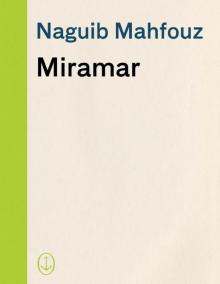 Miramar
Miramar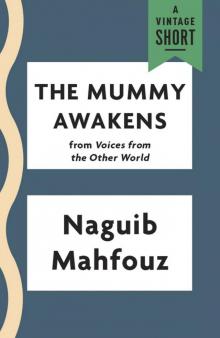 The Mummy Awakens
The Mummy Awakens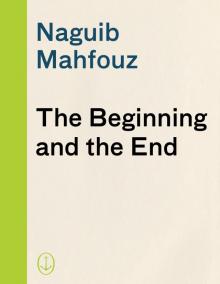 The Beginning and the End
The Beginning and the End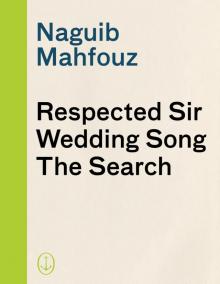 Respected Sir, Wedding Song, the Search
Respected Sir, Wedding Song, the Search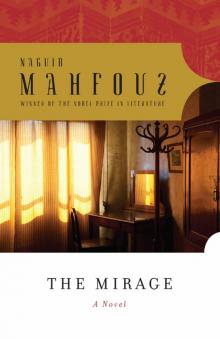 The Mirage
The Mirage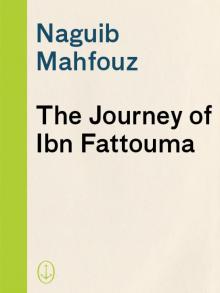 Novels by Naguib Mahfouz
Novels by Naguib Mahfouz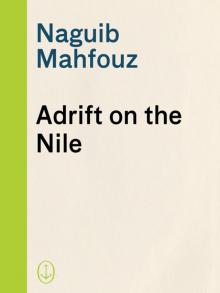 Adrift on the Nile
Adrift on the Nile Karnak Café
Karnak Café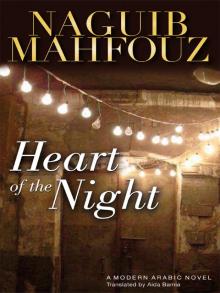 Heart of the Night
Heart of the Night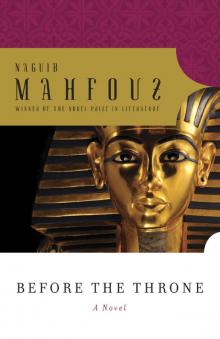 Before the Throne
Before the Throne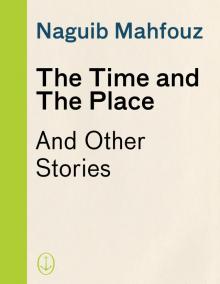 The Time and the Place: And Other Stories
The Time and the Place: And Other Stories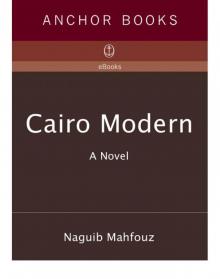 Cairo Modern
Cairo Modern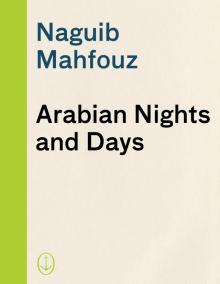 Arabian Nights and Days
Arabian Nights and Days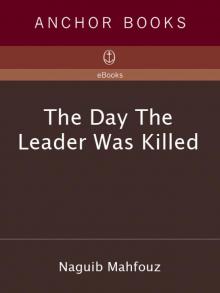 The Day the Leader Was Killed
The Day the Leader Was Killed Morning and Evening Talk
Morning and Evening Talk Three Novels of Ancient Egypt Khufu's Wisdom
Three Novels of Ancient Egypt Khufu's Wisdom Akhenaten: Dweller in Truth
Akhenaten: Dweller in Truth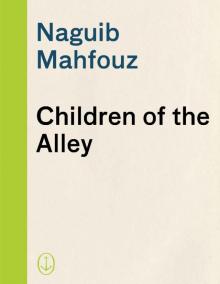 Children of the Alley
Children of the Alley Voices From the Other World
Voices From the Other World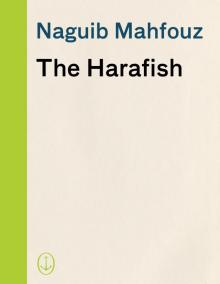 The Harafish
The Harafish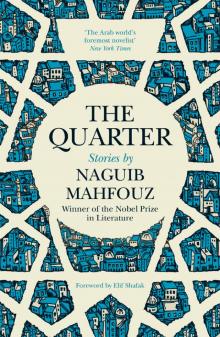 The Quarter
The Quarter The Seventh Heaven: Supernatural Tales
The Seventh Heaven: Supernatural Tales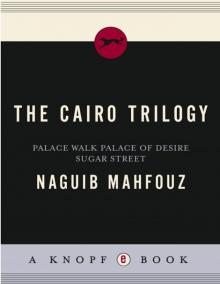 The Cairo Trilogy: Palace Walk, Palace of Desire, Sugar Street
The Cairo Trilogy: Palace Walk, Palace of Desire, Sugar Street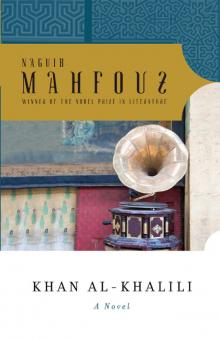 Khan Al-Khalili
Khan Al-Khalili Three Novels of Ancient Egypt Khufu's Wisdom, Rhadopis of Nubia, Thebes at War
Three Novels of Ancient Egypt Khufu's Wisdom, Rhadopis of Nubia, Thebes at War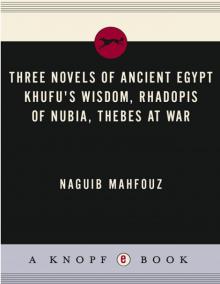 Three Novels of Ancient Egypt
Three Novels of Ancient Egypt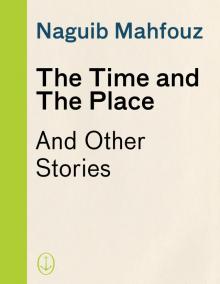 The Time and the Place
The Time and the Place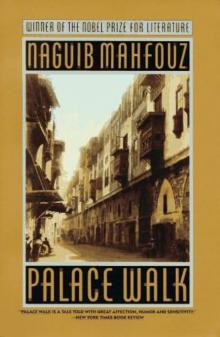 Palace Walk tct-1
Palace Walk tct-1 Akhenaten
Akhenaten The Seventh Heaven
The Seventh Heaven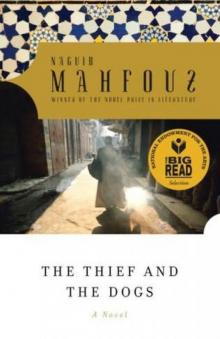 The Thief and the Dogs
The Thief and the Dogs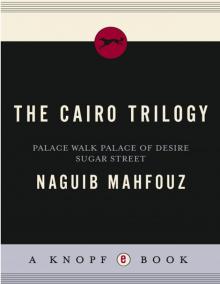 The Cairo Trilogy
The Cairo Trilogy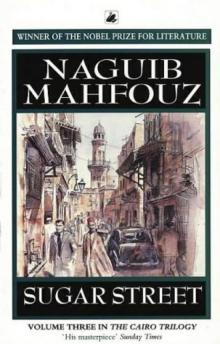 Sugar Street tct-3
Sugar Street tct-3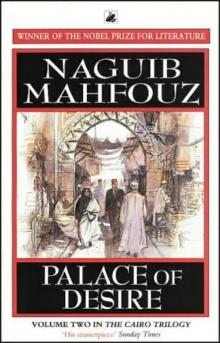 Palace of Desire tct-2
Palace of Desire tct-2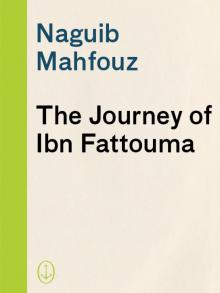 The Journey of Ibn Fattouma
The Journey of Ibn Fattouma